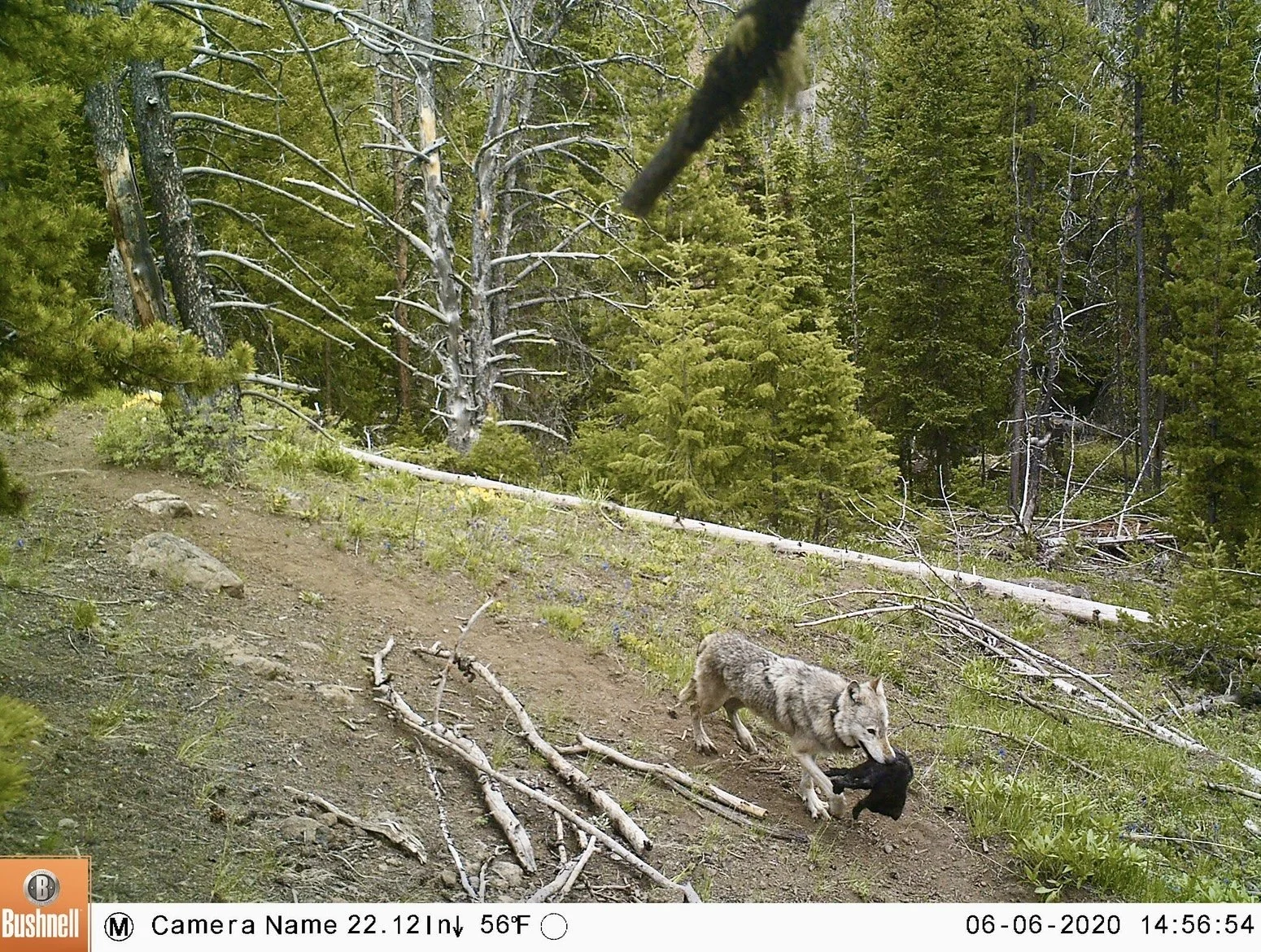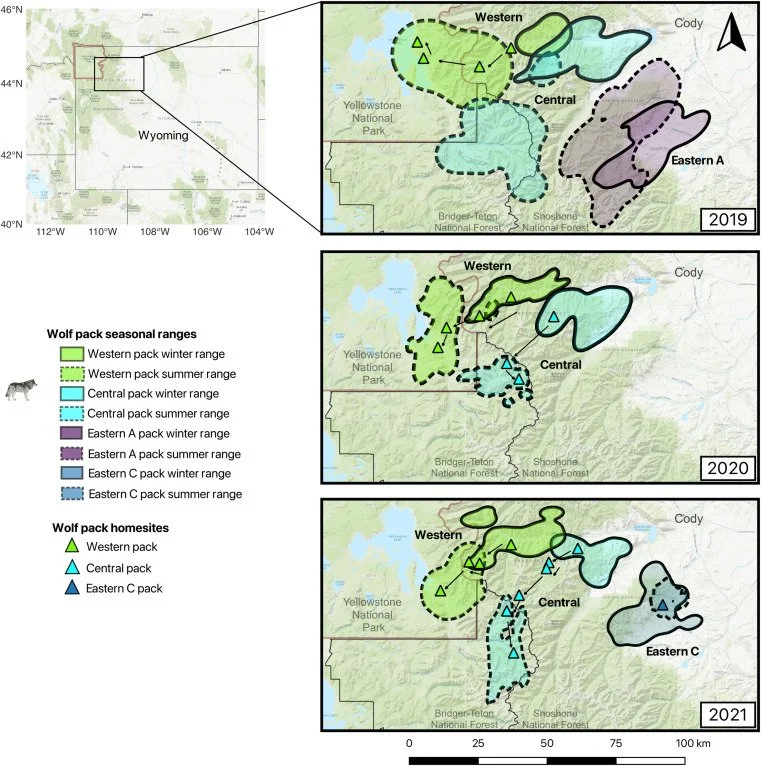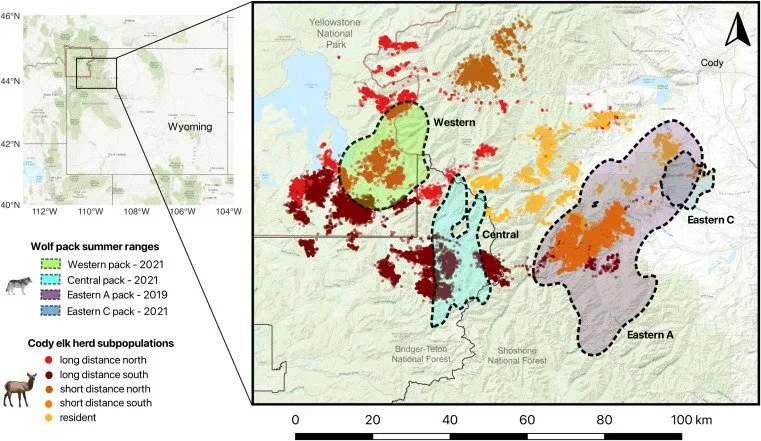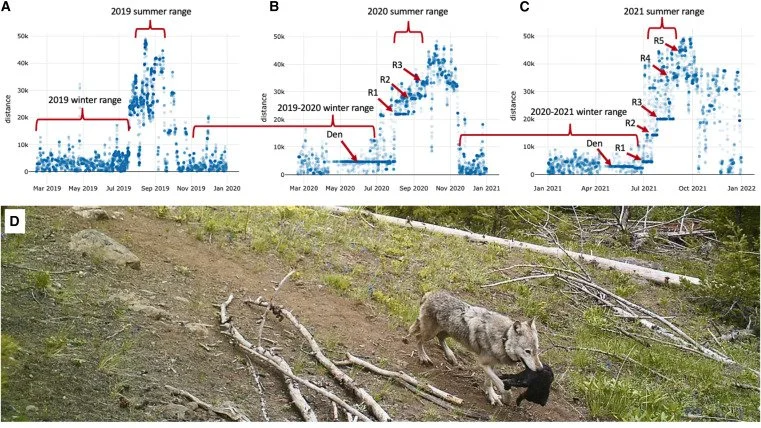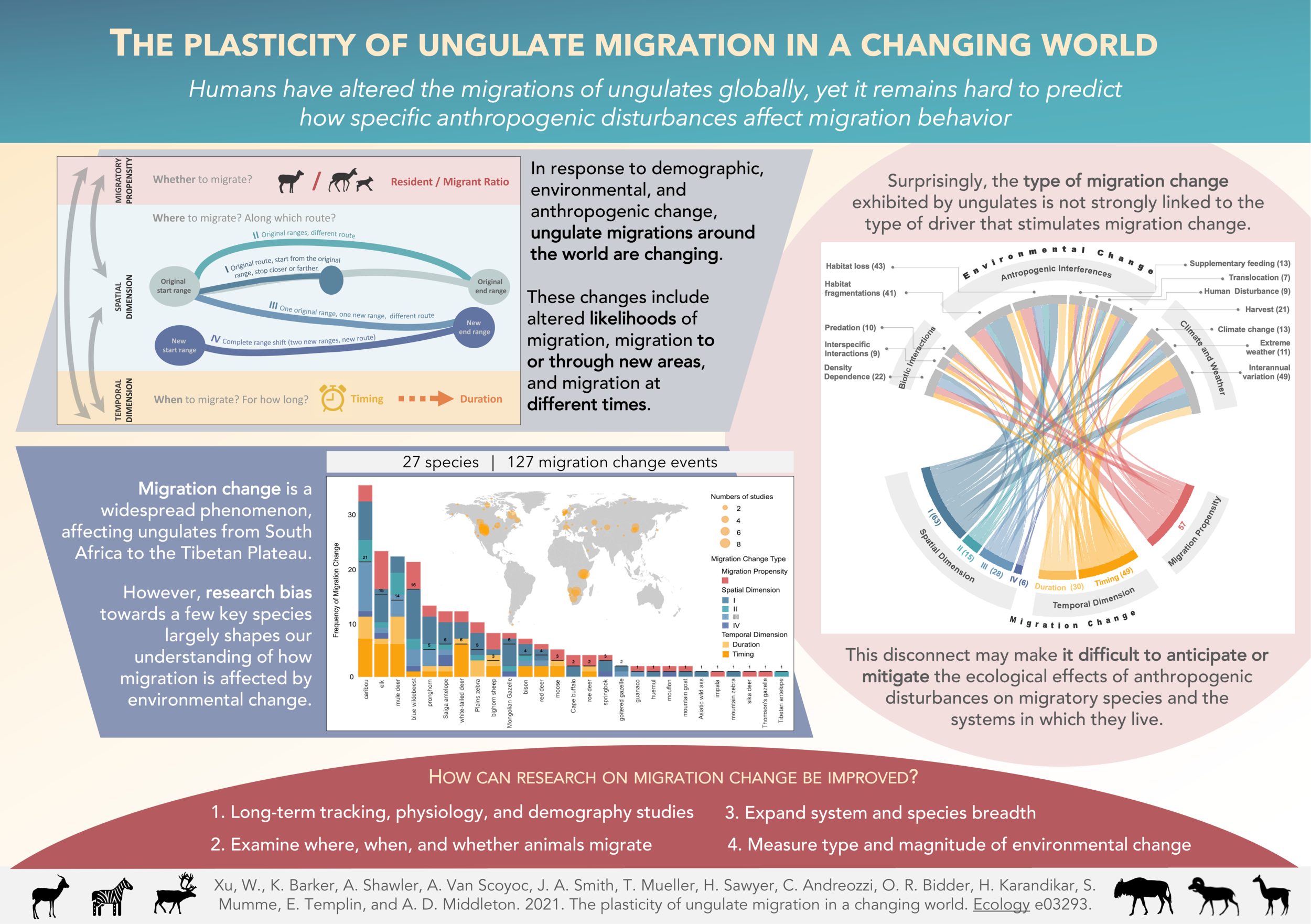Access the podcast here!
What is the legacy of Yellowstone wolves 30 years after their reintroduction?
August 20, 20253:00 AM ET
By Berly McCoy, Rachel Carlson, Emily Kwong,Hannah Chinn, Rebecca Ramirez
Wolves were reintroduced to Yellowstone National Park in 1995
mtnmichelle/Getty Images
Thirty years ago, park rangers reintroduced grey wolves into Yellowstone National Park. They wanted to restore the ecosystem and get the elk population, which had decimated the plant community, in check. And it worked – or so the popular narrative suggests. But is it really so simple? Today on the show, we explore how the Yellowstone ecosystem has changed since wolves returned and whether those changes can really be pinned solely on wolves. Plus, how the narrative of the Yellowstone wolf legacy could affect wolf reintroduction elsewhere.
Curious about other science controversies? Email us at shortwave@npr.org.
Listen to every episode of Short Wave sponsor-free and support our work at NPR by signing up for Short Wave+ at plus.npr.org/shortwave.
Listen to Short Wave on Spotify and Apple Podcasts.
This episode was produced by Rachel Carlson and Hannah Chinn, edited by Rebecca and fact checked by Berly McCoy and Tyler Jones. Kwesi Lee was the audio engineer.
EMILY KWONG: You're listening to Short Wave from NPR. Hey, Short Wavers, Emily Kwong here with producer Berly McCoy. Hi, Berly.
BERLY MCCOY: Hey, Emily.
KWONG: OK, what do you got for us today?
MCCOY: So I've brought you a complicated story about wolves in Yellowstone National Park.
KWONG: I've never been to Yellowstone. I've always wanted to go. Are the wolves a big deal there?
MCCOY: Yeah. So I live in Montana, and most anyone in the Mountain West will tell you, people have big feelings about wolves here.
KWONG: Yeah.
MCCOY: Some years ago, I remember driving by this huge billboard with a picture of a majestic-looking wolf with a message like, protect the wolves, and someone had shot an arrow through its forehead.
KWONG: Ho-ho! That sends a message. Um, why?
MCCOY: Well, wolves are predators, and some people view them as a menace. Even though they used to be native in the area, they were hunted almost to the point of extinction in the late 1800s and early 1900s, often with poison that killed other animals. It was nasty. Then 30 years ago, around a few dozen wolves were reintroduced.
KWONG: Uh-huh.
MCCOY: And now there's a big scientific debate about how they've affected the ecosystem.
KWONG: OK, 30 years of wolf reintroduction. We're recognizing that anniversary with this episode. What is the debate?
MCCOY: Well, first I'll say most everyone agrees that the absence of wolves and other predators caused a spike in the elk population. And these elk ate up all the trees and shrubs, especially by the rivers. And because of this, the beavers left. So no more dams. The rivers changed. They got deeper and faster. So wildlife ecologist Avery Shawler says after the wolves came back--
AVERY SHAWLER: The story goes that wolves impacted the density or behavior of elk so much that the effects cascaded trickle-down to aspens and willows, which affected beavers and songbirds, and eventually changed the course of the rivers.
MCCOY: She told me a few years after the first wolf reintroduction, one group of scientists started detailing this ecosystem-wide change and claiming the wolves were causing these huge ripple effects. The media picked up the story and ran with it, and to a large extent, that's the story that stuck.
KWONG: You sound skeptical of this wolf narrative. Is there another side to the story?
MCCOY: There is. I talked to a lot of scientists who say this story is way too simple and overstated, and that wolves are just one piece of a much larger puzzle for how elk numbers dropped.
KWONG: So today on the show, we explore the legacy of wolf reintroduction in Yellowstone National Park three decades on.
MCCOY: Plus, how some scientists think wolves' effects on the ecosystem have been overplayed and the potential consequences of getting the narrative wrong.
KWONG: You're listening to Short Wave, the science podcast from NPR.
[MUSIC PLAYING]
KWONG: OK, Berly, so we're talking about a dispute among scientists regarding this Yellowstone wolf narrative. So for a long time, the story went that when wolves were reintroduced in 1995, so 30 years ago, the entire ecosystem became altered. Where did that narrative come from?
MCCOY: So it really starts with data collected in the '90s by then-graduate student Eric Larsen at Oregon State University.
ERIC LARSEN: I wasn't looking at, you know, wolves particularly at all. I was looking for reasons why aspen wasn't reproducing in Yellowstone Park.
KWONG: OK, so he's a tree guy, this Eric.
MCCOY: Yes. And this was a few years after wolves were reintroduced in Northern Yellowstone. Eric was looking at current and archival tree ring data, and he found that growth had fallen off around the 1920s.
KWONG: What happened in the 1920s?
MCCOY: Well, that's around the time humans had killed so many wolves that they were basically locally extinct. And the technical term for this is "extirpated." So Eric and his advisor William Ripple-- he goes by Bill-- hypothesized that because the wolves were gone, elk numbers exploded, and those elk started eating the trees.
KWONG: I had no idea that elk ate trees. Uh, they sound voracious. So essentially their hypothesis was less wolves meant less aspen trees.
MCCOY: Yes, aspen and other vegetation like willows. So after wolves were brought back, the natural question became, did the trees come back, too?
KWONG: OK.
MCCOY: So in 2001, they published a paper where they looked at tree growth in more than 100 stands of aspen, this time looking at the height of the tallest tree in the stand. And they found trees were growing better where wolves spent more time.
KWONG: [LAUGHS] Wow.
MCCOY: Presumably, because elk were afraid of the wolves and leaving the trees alone.
KWONG: OK, I can see how a straightforward narrative then emerged from this finding, that the livelihood of the trees was somehow linked to the wolves.
MCCOY: Yeah, exactly. And Eric's advisor, Bill, took off with this line of reasoning. Along with another scientist, Bob Beschta, they started publishing more papers about how wolves have these cascading ecosystem effects.
KWONG: OK. What does Eric think of all of that, the guy we met in the beginning?
MCCOY: Well, he went in a different direction. Eric kept going back to those 100 aspen stands year after year, diligently collecting data.
LARSEN: I just had a feeling [LAUGHS] that if I stuck with it for 20 years, I could show something important.
MCCOY: And he ends up teaming up with another group who used the same data set, but instead they look at average growth.
KWONG: OK, instead of just the tallest tree.
MCCOY: Right. And Eric and his new collaborators come to a different conclusion about the aspen. Here's one of those scientists, Lainie Brice.
LAINIE BRICE: Some of them are doing really, really well. Some of them haven't recovered at all. Some have died out entirely. So it's a very patchy response.
MCCOY: And Bob and Bill agree the recovery is kind of patchy.
KWONG: OK.
MCCOY: Where those two teams disagree is how the wolves influenced this recovery. Bob and Bill say wolves have unmistakably triggered this change. Eric and his team say it's more complicated than that.
KWONG: OK, so people agree the trees have come back. They agree the recovery has been kind of patchy. They don't agree on what the wolves had to do with it. And I guess, the real question I have is about the creature in between, the elk. Have elk numbers gone down since the wolves came back?
MCCOY: Short answer, Emily, yeah. There were around 12,000 elk when the wolves were wiped out in the '20s. And the population grew over the following decades, reached a high in 1994 of close to 20,000.
KWONG: That's a lot of elk.
MCCOY: Yeah, and that number quickly plummeted back down to around 12,000 after wolves were reintroduced the following year. But Emily, there's another variable here.
KWONG: What's that?
MCCOY: Hunters.
KWONG: Oh, humans.
MCCOY: Humans.
KWONG: So wait, people can hunt in Yellowstone?
MCCOY: No, not in Yellowstone. Hunting is prohibited in the park. But the winter of '96-'97 was really harsh, and that pushed a lot of elk outside the park in search of food.
KWONG: Hmm, which exposed them to hunters.
MCCOY: Exactly. That year, hunters killed more than 3,000 elk. And hunters are often killing prime-aged females, whereas wolves usually kill the very old or the very young. So many scientists say hunters had a bigger impact on the elk population than wolves. And on top of that, Lainie, the scientist from earlier who saw the patchy aspen recovery, said they looked at where elk were spending their time, and--
BRICE: We didn't really see much different in elk browsing activity depending on wolf risks.
MCCOY: Meaning elk might avoid eating aspen in some areas at certain times because wolves are there, but they're not avoiding the area altogether.
KWONG: Oh, that's a real plot twist. So it's not true that the elk are just avoiding areas where wolves are. There are some places, perhaps, where wolves and elk are coexisting?
MCCOY: Yeah, and this finding has shifted the narrative. Wolves may be eating elk, but they aren't scaring them away entirely.
KWONG: [CHUCKLES]
MCCOY: And Emily, at the same time wolves disappeared, humans were also killing two other predators of elk, so cougars and bears. And their decline likely also contributed to the elk boom.
KWONG: All right, so we got cougars and bears and wolves. It's not just the wolves eating the elk, and that's the end of the story.
MCCOY: And then there are the beavers.
KWONG: How many animals are involved in this--
MCCOY: I know.
KWONG: --literally?
MCCOY: I know. I'm just going to bring the one more in. OK, so there's a lot. Here's the situation. Beavers need these river shrubs, called willows, for food and building their dams. And during the elk boom, elk ate those willows, so the beavers moved out.
KWONG: These elk just won't quit. That's what I'm also learning from this story, is these elk, when they want to eat trees, they're going to make sure that happens, you know.
MCCOY: And elk gotta eat. But Emily, beavers have made a comeback partially because of humans.
KWONG: So, like, humans are one of the biggest drivers of change in Yellowstone.
MCCOY: Yeah. So scientists relocated dozens of beavers in the '80s and '90s in the area just north of the park. And over time, some of them moved into the park.
KWONG: Wow.
MCCOY: Tom Hobbs, an ecologist at Colorado State University, has studied beavers and willows in the area for the last couple decades. And he says beavers have returned to the bigger streams and rivers in Yellowstone. But they're too big for them to dam, which means--
KWONG: Ha.
MCCOY: --maybe the return of the beavers hasn't changed the course of the rivers.
KWONG: Yeah. OK, so any narrative that is simplistic is just not going to work in Yellowstone, especially the one that the wolves affected the elk, which affected the trees, which affected the beavers, which affected the rivers-- it's, again, all too simplistic.
MCCOY: Yeah, and that's not to mention other complicating factors that we can't really get into in the length of our podcast. So I'm not going to go there, but just know there are a lot more.
KWONG: Well, otherwise it'd be, like, an Agatha Christie-level murder mystery with many people in the drawing room with different weapons.
MCCOY: Isn't it already, though?
KWONG: Yeah. So Berly, I have a question. Those scientists, Bill and Bob, who originally linked wolves to this environmental cascade-- were like, it was the wolves-- what do they have to say about all this new data?
MCCOY: So they're doubling down. Earlier this year, they published a paper saying the trophic cascade in Yellowstone, which they say was due to wolves and cougars, was stronger than most trophic cascades reported globally. And other scientists just published a preprint rebuttal saying that analysis was flawed and that the environmental effects of wolves weren't nearly as strong as they're suggesting.
KWONG: Arrows fired straight into each other's research, like that billboard. Outside of uncovering truth for truth's sake, why is it so important to get this story right, the legacy of the wolves in Yellowstone and their reintroduction?
MCCOY: Because in response to that very simple narrative we started the episode with, people in other areas are pushing to reintroduce wolves where they live in an effort to restore the ecosystem.
KWONG: Oh.
MCCOY: And they're often using Yellowstone to justify it. But if people expect wolves to have these sweeping environmental changes, especially in short time frames, it's setting up that community for failure.
KWONG: That's a fascinating takeaway. Yeah. Because also, in addition to it being a mistake to overemphasize the ecological power of wolf reintroduction, I'm guessing not every place is like Yellowstone, which has these wide open swaths of land. You know, every region is different.
MCCOY: Exactly. And that brings up a huge hurdle in wolf reintroduction-- clashes with people. I talked to Sisto Hernandez, a rancher in the White Mountains in Arizona.
SISTO HERNANDEZ: On both sides of the border, my family's been in ranching for time immemorial.
MCCOY: So wolves were reintroduced around there in the late '90s. And he's part of his tribe's council on creating a coexistence plan to compensate ranchers for livestock losses. And he doesn't like that the wolves are there.
HERNANDEZ: There isn't much to generate revenue on the reservation. And ranching is one of those things that we can do. And it limits us on that.
MCCOY: And this is something that scientists told me over and over again, that if we get the Yellowstone narrative wrong, people could use it to justify wolf reintroduction in places very different from Yellowstone, where more people live, so more potential conflicts. They also said focusing on wolves ignores a lot. Here's Avery again, the wildlife biologist from the beginning of the episode.
SHAWLER: When you get this kind of tunnel vision on single species conservation, it can really ignore other bigger threats to wolves and other species that also matter.
MCCOY: She says, it's easy to focus on these grand narratives and people who see wolves as either menace or savior, but--
SHAWLER: There's a lot of good people doing a lot of the work in the middle. And ecology is really complex, and we're still in the early stages of seeing exactly how wolves impact the Yellowstone ecosystem.
KWONG: Definitely more questions than answers, but a lot of nuance. Producer Berly McCoy, hats off to you. Thank you for bringing us this story.
MCCOY: You're welcome.
[MUSIC PLAYING]
KWONG: This episode was produced by Hannah Chinn and Rachel Carlson. It was edited by our showrunner Rebecca Ramirez and fact-checked by Berly and Tyler Jones. The audio engineer was Kwesi Lee. I'm Emily Kwong. Thanks for listening to Short Wave from NPR.

